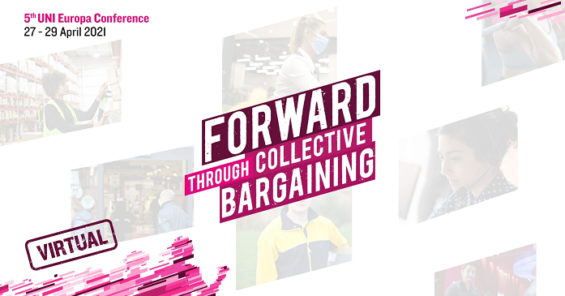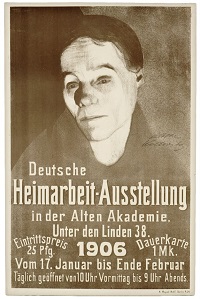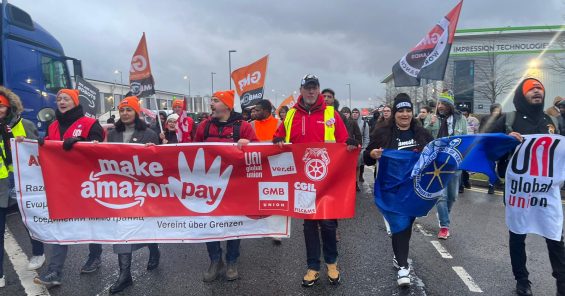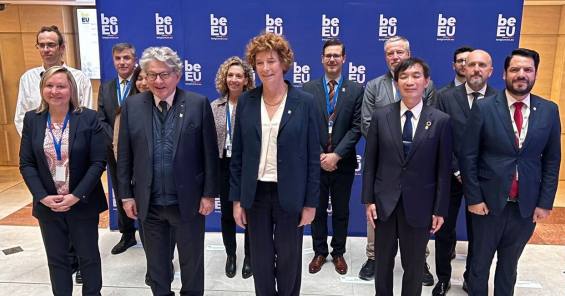5th UNI Europa Conference
Forward through Collective Bargaining
Keynote Address by Oliver Roethig, Regional Secretary (download pdf version here: in English & in French)
Brussels, 27 April 2021
Forward through Collective Bargaining
Colleagues,
“Forward through collective bargaining” is the slogan of our Conference. We must defend, extend and rebuild union power everywhere in Europe! And union power is best defined by our ability to bargain collectively. This is the key task of trade unions. UNI Europa is in the first place about strengthening your collective bargaining power at home. It is about what we can do together to reinforce unions in dealing with factors outside a country that impact on your collective bargaining. We want every worker throughout our sectors covered by collective agreements.
This is the mission of UNI Europa!
It is about working life allowing workers and their families to live in dignity. It is about the ability of workers to shape their own working lives collectively, to have a say in their workplaces. It has made the difference in the past and it will do so in the future, too.
Brothers an sisters,
What would happen if services workers across Europe were all covered by the best collective pay agreements in their country and sector? As our snapshot report shows, services workers would be a staggering 145 billion Euro better off per year. And tax and social security contributions would increase by 108 billion Euro.
Yet, what is the reality? Over the last decade collective bargaining coverage has dropped substantially. What our report also shows – and this is important – the less coverage, the more downward pressure on wages, even for those workers with collective bargaining. The point is: sectoral collective bargaining is the most effective buttress against bad pay and working conditions. As workers and citizens, we all benefit from collective agreements. It is a check on inequality and precarity.
The drop in collective bargaining has gone hand in hand with the rich becoming ever richer. Fat cat day was in early January. This is the day in the year when bosses have already made as much as an ordinary worker will do over the year. Today is 27 April. By now the big bosses in Europe have earned about the same amount this year as the median worker will in 15 years. By year end, that will be more than a lifetime pay for ordinary people.
Colleagues,
Even though all this speaks for collective bargaining and trade unions, both are under attack – openly like in Columbia or by stealth in Europe, precisely because we are organised labour.
At our last conference in 2016, we heard that the then Finnish government used a sledgehammer to destroy one of the best and strongest collective bargaining systems in the world. They didn’t succeed. Still, today, 5 years later, Finnish employers started their own attack refusing first to negotiate at sectoral level and then to stop collective bargaining altogether. We will hear about this later today from our Finnish colleagues. UNI Europe stands with you side by side in this fight.
We do fight back, and we win! Only, this month, Spain finally changed the law that sentenced trade unionists to prison for engaging in industrial action. Rather than criminalising them, the EU and governments should criminalise and certainly take strong action against union busting, wage theft and treating workers falsely as independent contractors.
And good news from Ireland, too. The citizens’ assembly, a kind of constitutional convention, calls for a legal right to collective bargaining in all sectors.
Colleagues, The talk in town is the EU’s proposal on a minimum wage. We will discuss tomorrow. What I want to highlight is the argument of one business association (not from our sectors): Wages are a matter for collective bargaining and there should be no interference by the EU. Well, we disagree. However, here my invitation to them and other employers: Let’s immediately get together at all levels to set fair and decent wages by collective agreement. Join us in ensuring that each wage is at a minimum 60% of the average and 50% of the median of all wages.
Brothers and sisters,
Our role as services unions is essential, for the services sector constitutes the core of our societies and economies. Services employ 70% of all workers and generate 70% of GDP. Indeed, when we talk about Europe’s future we actually talk by and large about the services sectors.
UNI Europa’s approach to strengthen the collective bargaining power of our affiliates has three elements:
First, bottom up, organising: building a strong membership basis that engages in trade union activities.
Second, top down, influencing EU politics, in particular to provide an enabling framework for collective bargaining.
And third, engaging with multinational companies to create a negotiating environment for our affiliates.
On top of that, we will continue working on cutting-edge collective bargaining issues to pool the knowledge of affiliates and develop guidelines jointly.
Forward through Collective Bargaining: Organising
When we talk about the organising dimension of “Forward through collective bargaining”, it is definitely not simply about recruiting new members. As important is to retain members and motivate them to join trade union activities. Over the last years, we have expanded our organising work with our affiliates with a clear objective to defend, extend and (re)build collective bargaining. We are not focusing on some companies or sectors. To be sustainable, we aim at sectoral collective bargaining, in all sectors, in all countries, based on a strong and participative membership.
Central and Eastern Europe continues to need our support and solidarity to fight in a hostile industrial relations environment.
Tomorrow, we will establish UNI’s South East European Organising Centre. It will build on the excellent work our affiliates have been doing with our support in Romania, in particular in the ICTS and finance sectors. They show us that sectoral collective bargaining is possible. The centre will complement the great organising work COZZ, the Central European Organising Centre, has been doing since we founded it at our last Conference in 2016.
Collective bargaining is under pressure in the traditional strongholds of European trade unionism, too. Therefore, we set up our European Power and Organising Centre (EPOC) in 2019. Its primary objective is to develop lead organisers capacity in our unions and on top we link their expertise through our monthly EPOC network meetings. EPOC has been so great a success that we need to see how we can put more resources into it.
Covid-19 has had an impact on organising activities. We moved to digital organising. While face-to-face organising cannot be replaced, working online allows us to react much quicker to events. In future, our organising model will combine the strengths of both offline and online organising.
Thanks to all of you. UNI Europa is in the lead on organising in Europe. Together we make a real difference for workers.
Forward through Collective Bargaining: EU Law and Policies
Collective bargaining, second, needs an EU legal and political framework that enhances the ability of our affiliates to bargain collectively.
The European Parliament shows the way by setting a target of reaching 90% collective bargaining coverage by 2030. Two MEPs were the driving force: Agnes Jongerius of the S&D and Dennis Radtke of the EPP. They will be with us later on so that we can thank them for their assist.
What we expect now is that at the Porto summit in two weeks, the Commission, governments and the EP bring forward concrete legislative action to reach the goal of 90%. And the EU has much to do to compensate for its disastrous Troika policy over the last decade.
In our lobbying activities here in Brussels, strengthening collective bargaining is always part of the equation.
On general matters, like platforms, due diligence and European works councils, we work closely together with the ETUC and the other European trade union federations. We have some of my fellow general secretaries here with us. Thank you for the good cooperation and it is a pleasure for me to coordinate our work.
Within UNI Europa, at cross-sectoral level, key legalisation for us has been the digital service pack, equal pay and AI. Much of the work is done in our sectors: the campaign against further postal liberalisation, protection of self-employed workers and financial regulation that respect finance workers. Just to name a few.
One success I want to highlight particularly – EU law and policies actually expanding the scope of collective bargaining. I am talking about the copyright directive. We achieved to enshrine the principle of fair remuneration by collective bargaining. The first collective agreements on this have already followed in Germany and Sweden between our affiliates and Netflix.
Over the next years, we will explore systematically how we can use EU legislation and policies to defend, extend and (re)build collective bargaining.
Remember our last Conference in 2016. Then we did something new for trade unions in Brussels. We launched a poster campaign in metro stations, targeting the Commission directly for mocking our hairdressing social partner agreement. I can tell you we ruffled some feathers up to the very top. We didn’t make the Commission change course and legislative on our hairdressing social partner agreement, but we were successful anyway. For the first time ever, the Commission made a commitment to join social partners in implementing an agreement. This has meant constant engagement rather than a legal text that is left to its own devices. This strengthens social dialogue and delivers for hairdressers perhaps even better than law.
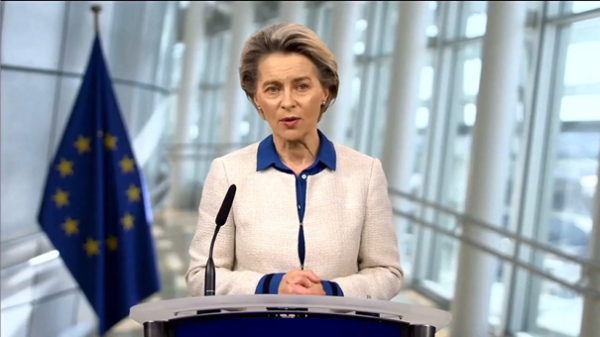
Yes, collective bargaining is crucial. But we need more than nice words. So, our direct reply to President Von der Leyen is: Go for the lowest hanging fruit and the sharpest tool public authorities have to promote collective bargaining: Public procurement. Public procurement means workers that generate 14% of GDP and 2 trillion Euro per year.
Last month, over 100 UNI Europa trade union leaders, you, sent a simple request to von der Leyen: Change EU public procurement rules now: No public contracts for companies without collective agreements. We want a swift legislative initiative now.
Tomorrow, we amplify this demand towards von der Leyen and the European institutions together with MEPs, the ETUC and other European unions.
Colleagues, be ready!
Getting this change will not only generate a leap for collective bargaining, the lowest paid will benefit in particular. UNI Europa will not rest until we get this change to EU law.
Forward through Collective Bargaining: Multinational Companies
When we talk about a 90% target for collective bargaining coverage, this immediately pushes our work on multinational companies centre stage – the third dimension of “Forward through Collective Bargaining”. The aim cannot be reached without these companies effectively having 100% coverage throughout their operations.
For our snapshot report, we therefore surveyed key multinational companies that have a global framework agreement with UNI. The result was varied, indicating the many challenges for collective bargaining, also on the side of employers. Yet, the survey showed, too, there is a clear path forward. Our plan is to engage with our multinationals but also sectoral social partners to push together towards the 90% coverage.
To put it simple, our demand to multinational companies is an active commitment to champion and engage in collective bargaining at all levels and wherever they operate.
Ourselves, we will better coordinate our work in multinationals, not least through our trade union alliances and European works councils. A key purpose is to use these European structures to create a negotiating environment for our affiliates nationally. EWCs and trade union alliances create push and pull effects by putting issues on the agenda locally and interlinking workforces across borders. As the example of the Czech finance industry shows, with European-wide support of our affiliates, a union can rally multinational banks to engage rather than leave sectoral collective bargaining. Together we are strong.
This is more than necessary if we look at biggest challenger we all face: Amazon. You might remember Star Trek and the Borgs.

Amazon is like the Borgs. Today, Amazon tells us “You will be Amazonised – Resistance is futile”. Amazon sees workers as robots, an extension of its algorithms. It wants to integrate all of us into its business model – workers, competitors and societies.
Today, it is already a major player across many services sectors. UNI Europa is on the frontline. Together with our affiliates, unions, consumers, civil society, government and even companies, we are tackling Amazon worldwide: through organising, industrial action and corporate campaigning, through lobbying for closing the loopholes Amazon uses to gain unfair competitive advantages. And if Amazon is too big to be regulated, it should be split up – it is as simple as that.
On Thursday, our colleagues will tell us about their fights. They will show us that Amazon can be forced to the bargaining table. Indeed, our response to Amazon is: “You will be Europeanised – resistance is futile”.
Forward through Collective Bargaining: Future of Work
The world of work in services is undergoing massive changes – with accelerating speed, boosted further by the Covid-19 crisis. We are faced with a twin transition to a climate-neutral and digitalised Europe.
Collective bargaining is a tried-and-tested method for mastering transformation and dealing with crisis.
UNI Europa – as are our unions – are engaging in the process, with our employers, the EU, governments and civil society.
Internally, over the last years we have looked at particular cutting-edge collective bargaining issues. We started with working time in 2018.
Culminating in two webinars last months, we also analysed the topics of upskilling, the self-employed, AI and restructuring. The purpose is to share the experience of affiliates in how best to address these issues and develop jointly a framework that can help unions in collective bargaining.
There is a second purpose, too. Such frameworks help us to fine-tune our political demands to the EU institutions; we saw this already with the topic of AI.
The hot theme over the coming months will be remote work, both in terms of collective bargaining and politics. With the work done at UNI Global level – with UNI Europa’s support – we are already on a good way.
Colleagues,
One of the rallying points for the trade union movement a century ago was stopping the exploitation of home workers. Often an entire family was working on bad jobs for bad pay.
In 1906, the labour movement in Germany opened an exhibition on the plight of these workers. With the public attention generated, it fastens rules that stopped this exploitation.
You see the similarities. And who knows, the little guy might do some gig work, too. Perhaps not today, but tomorrow.
Remote work, AI and platforms have put us on a very slippery slope back to 19th century, when workers’ rights did not exist, when employers had no obligations but for piecework pay. With the work we are doing on those topics, we are pushing to make sure that laws and collective agreements force business to respect fair pay and working conditions.
Covid 19 Crisis
Colleagues,
Covid-19 shows where collective bargaining is strong, people are safer and better able to cope.
At European level, UNI Europa has cooperated closely with our employer counterparts in sectoral social dialogues. Together, we have adopted almost twenty joint statements on sector-specific measures on the Covid crisis.
On top of that, with the employers across our social dialogues we have agreed a joint statement on how we want to develop the social dialogues for services further and what we expect from the Commission exiting the crisis. One point is more link up among the different dialogues considering that the problems services industries face are overlapping. Indeed, the boundaries between sectors are getting more and more blurred.
In multinational companies, we had good cooperation, too. Yet, the crisis has accelerated restructuring processes and too many managers evade their legal obligations. With our EWCs and trade union alliances, we push for strict enforcement so that worker’s representatives are in a position to exercise their consultation and participation right.
The EU and Europe’s governments have committed to spend over a trillion Euros on their recovery plans. The pandemic calls for a massive and lasting shift of public investment to the services sectors. Jointly with the ETUC, we demand that this money is spent on creating jobs, good paying jobs. Jobs that allow – no, encourage – workers to join unions and be covered by collective agreements.
Austerity didn’t work last time, so don’t even try again.
Colleagues,
Many of our colleagues have been on the frontline of the Covid-19 crisis. Care workers, cleaners, shop workers and all essential workers – working heroes – have been risking their lives to keep our societies going. Suddenly everyone notices them, realising without them society cannot function.
No, Boris, not you.
But to be blunt: what essential workers need is clapping and cash. Let’s honour these essential workers. Let’s work for a new social consensus that lifts their pay and working conditions.
And by the way, Boris, trade unions will not permit a low wage, low regulation “Singapore on Thames” style economy in Britain. Despite Brexit, we are still one Europe – and one European trade union movement. UNI Europa is the place where we build solidarity with workers and trade unions throughout Europe, not just in the EU.
UNI Europa and UNI Global: An Integrated Organisation
UNI Europa is not only about Europe. We are the backbone of UNI Global Union, and our strength is that together we are one integrated organisation fighting for workers’ interests both in Europe, and across the globe. The best examples are our work on Amazon and due diligence as well as the Bangladesh Accord. Stronger together in Europe, stronger together with the entire UNI family worldwide.
Collective Bargaining and Democracy
Colleagues,
Our mission is not only about the workplace! Democracy at work and democracy in society are the two sides of the same coin. We have to make sure everybody knows this by heart.
Sectoral collective bargaining is a public good! It is not only about us as trade unions fighting for it. Everybody: governments, parliaments, EU institutions, employers, NGOs and society at large need to get behind it. Let’s all go out there – fight for a level playing field in collective bargaining – in our sectors, in each country and in Europe.
And let’s counter all attempts of populists to say democracy doesn’t work and that they are the real advocates of workers.
No, it is the workers’ movement present here today. It is the trade unions. We are the collective voice of workers coming together to have a say!
Collective bargaining is the antidote to populism!
Collective bargaining is about working life allowing workers and their families to live in dignity!
Conclusion
Colleagues,
To sum this all up, our key priorities over the next four years are.
First, bottom up, expanding our organising capacities.
Second, top down, ensure that public contracts go only to companies with collective agreements.
And third, let’s Europeanise Amazon. Resistance is futile.
Brothers and Sisters,
I am missing you, the Brussels team does. By joining online from all over Europe, we miss the opportunity to be together, to talk to one another across countries and sectors – face-to-face.
This is a conference in times of Covid-19. We had a great start this morning. And already now a great thanks to our Belgian host unions.
Over the next three days, we make this Conference a rallying point for services workers in Europe. Let’s make sure our message is heard loud and clear.
Forward through Collective Bargaining!
Thank you!
